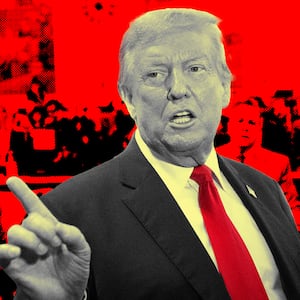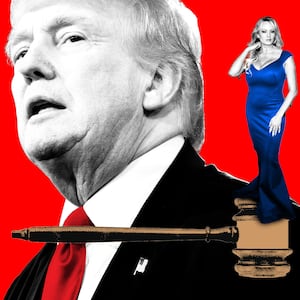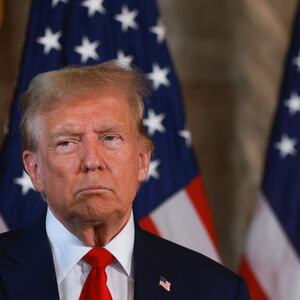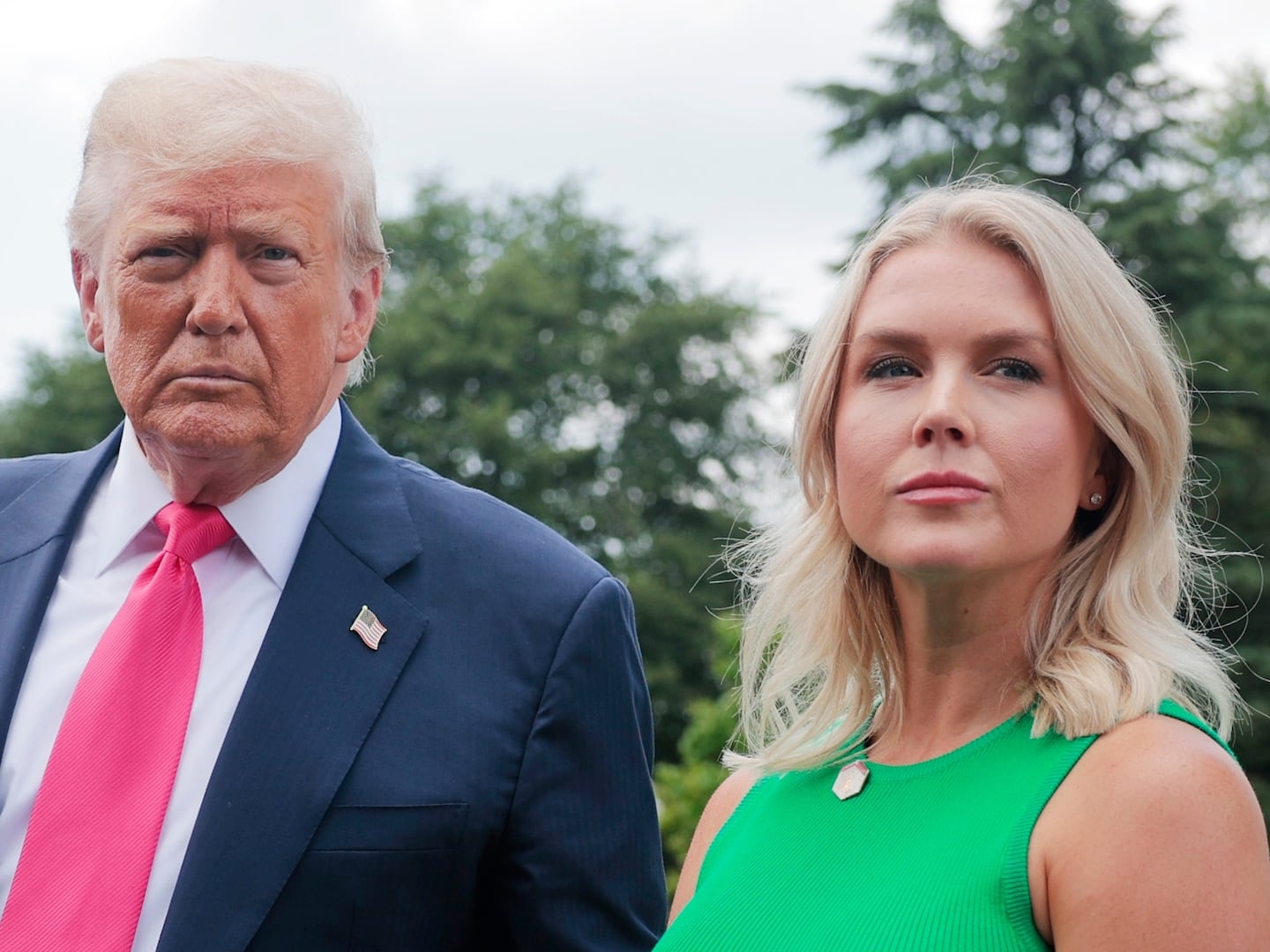After seven years, three tell-all books, two trips to the Supreme Court, and one historic indictment, Donald Trump is finally—officially—the first former American president to stand trial on criminal charges.
For the next two months, Trump’s 2024 presidential campaign will hardly be anything but a courtroom sideshow, as he takes the half-hour drive from his gilded penthouse to Manhattan’s criminal courthouse four days a week and fights for his freedom.
Trump said on Friday that he plans to testify in the upcoming trial, though that’s far from definitive. Trump has repeatedly projected confidence about his legal troubles publicly only to ghost in the courtroom when presented with the opportunity to testify. That was his exact game plan in the original E. Jean Carroll rape defamation case last year.
What’s different in this case, however, are the stakes. Instead of a civil case with financial penalties, Trump is staring down the possibility of jail time. And instead of Trump opting to attend court, like he did most days in his recent bank fraud trial or the two Carroll lawsuits, he is obligated to be there for this criminal case.
He will be forced to listen, quietly this time, to the Manhattan District Attorney tell jurors a story—a story about a presidential candidate trying to save his campaign from catastrophic embarrassment. The DA will detail how Trump, reeling after comments he made on video about his predatory sexual behavior were leaked to The Washington Post in the closing weeks of the 2016 campaign, allegedly paid several women to keep quiet about his extramarital affairs, employed a trusted lawyer to cut the deals, and then oversaw longtime accountants faking business paperwork to throw anyone off the scent.
It’s a story that’s been told many times, albeit not in court. The porn star Stormy Daniels, also known as Stephanie Clifford, described in her memoir, Full Disclosure, how she was pressured to take the deal. Michael Cohen, who has since lost his law license and served time in federal prison, detailed what it was like to cover up the alleged crimes of his former boss in his book, Revenge. And in the most unexpected primer of them all, frustrated prosecutor Mark Pomerantz explained how the many possible criminal investigations into Trump’s behavior paved the way to go down this narrow legal route and ultimately indict the former president.
What could have been a dramatic racketeering case in true New York fashion instead gave way to 34 felony counts of falsifying business records. Critics have called it the least serious case against Trump, but its simplicity could very well be its strength.
Trump’s checks to Cohen bear his signature. And Cohen himself can assert in court that the $420,000 he was paid for “legal fees” was really just a reimbursement.
Norm Eisen, an attorney whose role in building the case for Trump’s first impeachment consisted of reviewing some of the same evidence that led to this trial, has spent months trying to recast the public’s understanding of the case. In a series of interviews with The Daily Beast, Eisen repeatedly emphasized that this is “an election interference case,” one that far predates Trump’s 2020 attempt to remain in the White House by spreading lies and engaging in political subterfuge.
The start of Eisen’s new book, Trying Trump, which serves as a trial guide, makes that point right in the introduction.
“Make no mistake: The Manhattan case is not just about hush money,” he wrote.

Former President Donald Trump during a joint press conference with Speaker of the House Mike Johnson (R-LA) at Mar-a-Lago.
Photo by Joe Raedle/Getty ImagesThe salacious details of Trump’s extramarital coverups will be on display, but the real threat to his liberty—and his legacy—will come from the paper trail.
“We’re going to see a lot of lengthy and dry testimony regarding business records interspersed with extremely intense testimony and cross-examination of cooperators. It’s going to be quite a contrast between peeling paint and gladiatorial combat,” said Tess Cohen, a former Manhattan prosecutor.
The stakes are high—but maybe not as high as Trump’s foes would like.
Yes, theoretically Manhattan DA Alvin Bragg Jr. might be the first prosecutor to ever successfully send an ex-commander-in-chief to prison. But as a first-time offender—or rather, the first case that names him specifically as the defendant—Trump will more likely face probation if he’s convicted. And while sentencing could very well keep him from attending, in person, the Republican convention that is set to nominate him as the party’s favorite, the actual consequences will almost certainly be tied up in appeals that could push back any punishment until well after the November election.
But long before any of that, prosecutors and defense lawyers will need to agree on a jury. And that potentially quarrelsome process starts on Monday.
The jury will be composed of 12 people from Manhattan, plus perhaps six backups in case anyone has to bow out. The jurors will be asked 42 questions in a questionnaire on Monday. And those questions were the product of intense battles between the defense and prosecution, with New York Supreme Court Justice Juan Merchan ultimately settling on questions ranging from standard biographical information—“In what neighborhood do you live?” and “What do you do for a living?” or “Are you married?”—to more insightful questions like what media do you consume, have you ever attended a Trump rally, or “Do you have any feelings or opinions about how Mr. Trump is being treated in this case?”
There are a number of questions about impartiality, such as “Can you give us your assurance that you will decide this case solely on the evidence you see and hear in this courtroom and the law as the judge gives it?” and “Is there any reason, whether it be a bias or something else, that would prevent you from being fair and impartial if you are selected as a juror for this case?”
But there are other, less direct questions that lawyers will use to try to assemble the most favorable juror:
- “Do you have any opinions about the legal limits governing political contributions?”
- “Have you, a relative, or close friend ever been employed in the accounting or finance field?”
- “Do you listen to talk radio? If so, which programs?”
For months, Trump’s lawyers have been telling Justice Merchan that a fair trial will be virtually impossible. In court, lead defense attorney Todd Blanche has decried the prospect of putting his client on trial in the midst of a contentious election, the purported impossibility of selecting an impartial panel of New Yorkers who have already heard so much about this drawn-out case, and how wrong it would be to haul everyone into court during the Jewish holiday of Passover and the New York City school system’s spring break that starts next week.
But their repeated attempts to delay the trial have failed. Their bid to dramatize a last-minute document dump by the Southern District of New York—a curious development that reeked of gamesmanship by a prosecution office that previously investigated this matter but conveniently stopped short of targeting Trump while he was still at the White House—fizzled to nothing. As did their eleventh hour attack on the judge himself, which sought to knock him off the case on the specious grounds that he was somehow compromised because of his daughter’s involvement in Democratic politics.
Duncan Levin, a former prosecutor with the office briefly represented a potential witness in the investigation, stressed that this is not the DA’s first rodeo.
“On large measure it’s going to be much like every other case,” he said, noting however that the next few days will bear the difficulties of adjudicating a man whose hateful political rhetoric has drawn the ire of everyone but his cult-like MAGA followers.
“While most jurors have never heard of a defendant, everyone knows him and some have even written about the guy,” Levin said.
However, Levin expects that the former president’s lawyers will only succeed in knocking someone off the panel if the person stands out—by actually expressing a compromising view about the actual case at hand. And he noted that Justice Merchan—who has already castigated Trump’s lawyers for trying to delay the trial multiple times—is done playing games.
“This judge is very sharp and very experienced. He has a tight grip on the courtroom. He won’t allow jury selection to devolve into political debate in the courtroom,” Levin said.
But Levin, like several other lawyers who spoke to The Daily Beast on condition of anonymity because of their proximity to the case, recognizes that the defining quality of the trial will be evident from the start: the threat of physical violence.
Merchan has already imposed gag orders on Trump prohibiting him from launching attacks against DA Bragg and court staff—and actually had to expand that muzzle to stop Trump from threatening lower-level prosecutors and the judge’s own family. The threat of danger is so high that the judge has even decided to keep the jurors’ identities secret, barring journalists in the courtroom from having cellphones lest anyone snap a photo and give increasingly enraged Trumpists a target.
Other judges have taken similar precautions. Fear of reprisal kept jurors anonymous at Trump’s first and second federal trials on rape defamation, where jurors ultimately awarded Carroll verdicts worth $5 million and another $83 million, respectively. Another state judge had to repeatedly punish Trump during his bank fraud trial for “blatantly” violating a gag order by continuing to threaten a judicial clerk.
But those cases have shown the justice system’s inability—or reluctance—to fully rein in the man whose authoritarian character has redefined American politics.
Trump has created a blueprint for defying the rules with impunity: saying whatever he wants, appealing gag orders, then relying on the Ancient Greek rhetorical device of paralipsis to make thinly veiled attacks, claiming to not say something by outright saying it.
When that doesn’t work, he relies on attack dogs, like Rep. Elise Stefanik (R-NY) to say what he legally cannot.
In that sense, Monday marks more than just the start of his first criminal trial, an unprecedented moment in the country’s history. It’s also a test of the justice system’s institutional power, the fortitude of a dozen New Yorkers, and a state court judge’s resilience.
Willard Sterne Randall, a former investigative journalist who now teaches history at Champlain College in Vermont, points out that the only time a presidential candidate has found himself behind bars was when the socialist Eugene V. Debs was jailed for speaking out against World War I.
“I think we're in more dangerous times even than Debs,” Randall said. “The issue was pretty clean in 1918. You were either for war or against it. There were dissenters at that time, but there was never any hint of violence.”
“When a judge has to sit down now and decide what to do, does he have in mind the potential for armed conflict as a result of it?” he asked. “There’s so much hatred loosed in the land right now. How does a judge sit down and dispassionately decide on the fate of a former and maybe future president? I don’t know.”









